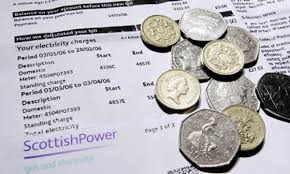UK energy bills soar
UK – A survey conducted by Ipsos MORI on behalf of the Energy Savings Trust has revealed that electronic gadgets have added £600 million to the UK energy bill. The Trust stated that the proliferation of household appliances, including heating and cooling devices, in the UK over the last five years is one of the major factors in this huge increase on the nation’s energy bills. The findings of the survey have been released to coincide with Big Energy Savings Week, a joint campaign with Energy Saving Trust, Department of Energy and Climate Change and Citizens Advice which starts next Monday and which is designed to help people cut their fuel bills and get all the financial support they are entitled to.
Almost a third of the 2,710 UK residents who participated in the survey (31 per cent) blamed their spouse for leaving appliances switched on around the house. Men appear to be the guilty party most often among adults with 36 per cent of women blaming partners compared to 26 per cent of men, while almost half (44 per cent) placed the blame on their children.
The findings from the survey reveals that the average number of gadgets in people’s homes has risen by 31% since 2010. This increase in gadgets is particularly noticeable in the kitchen where the number of gadgets has increased by 58 per cent and more than twice as many households now own smoothie makers, electric juicers and ice cream makers compared to five years ago.
As the number of devices in people’s homes has grown rapidly, so too have our energy bills as a consequence of leaving these devices on standby. More than three quarters (78 per cent) of respondents confessed to regularly leaving at least two devices on standby mode. Recent energy bills show that leaving an advanced set-top box on standby for 20 hours a day could cost around £20 a year alone just in standby mode.
Philip Sellwood, the Chief Executive of Energy Saving Trust, launched the report, saying “We are urging people to be in control of their energy use. There is a growing black hole in our energy bills because we prefer the convenience of standby, but many of us blame each other for leaving things on around the house and its adding £30 to our bills every year.”
Mr Sellwood continued, stating “Getting down on your hands and knees and working out what you can and can’t switch off can be a real pain for some of us. We suggest simply plugging everything that you can switch off into one extension socket and everything that you can’t into another.”
Also present at the launch of Big Energy Saving Week was the Energy and Climate Change Secretary, Amber Rudd, who said “My number one priority is to keep bills down for hardworking families and businesses across the country. Our reforms are pushing up competition, pushing down tariffs and saving households millions by switching energy supplier.
Rudd also added “But knowing how much energy you use – and waste by leaving appliances on standby – also goes a long way in helping put consumers in control of their bills. And with smart meters on their way, making bills more accurate and affordable will only get easier.”
Gillian Guy, the Chief Executive of Citizens Advice, also commented on the report, saying “Smaller energy bills could make a warm home in winter more affordable for everybody. Citizens Advice helps thousands of people a year who are struggling to afford their energy. Being on the best deal, saving energy where possible and getting support to switch where needed can have a massive impact on people’s ability to manage their energy costs.”
Guy concluded by urging customers who were finding it difficult to manage their energy bills to contact the Energy Saving Trust for advice, stating “If you are struggling with energy bills, worried about fuel debts, or need help switching, you can get advice from us online, over the phone, or by attending one of the hundreds of Big Energy Saving Week activities all across the country.”














